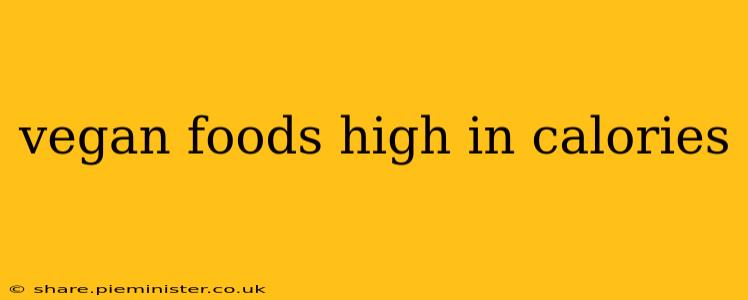Adopting a vegan lifestyle doesn't mean sacrificing delicious, calorie-rich meals. Many plant-based foods are surprisingly high in calories, perfect for those looking to gain weight, maintain energy levels, or simply enjoy satisfying, filling meals. This guide explores some of the best vegan options to help you fuel your body and achieve your dietary goals. We'll also address some frequently asked questions surrounding vegan calorie intake and weight management.
What are some healthy vegan foods high in calories?
Many nutritious vegan foods naturally pack a caloric punch. Instead of relying on processed vegan alternatives, focusing on whole foods is crucial for a balanced and healthy diet. Here are some excellent options:
-
Avocado: Rich in healthy fats and fiber, avocados are a calorie powerhouse. A single avocado can easily provide 300+ calories. Enjoy them in guacamole, smoothies, or simply sliced on toast.
-
Nuts and Seeds: Almonds, cashews, walnuts, chia seeds, flax seeds, and sunflower seeds are all excellent sources of healthy fats, protein, and fiber – and calories. A handful of nuts can provide a significant calorie boost.
-
Dried Fruits: While generally higher in sugar than fresh fruit, dried fruits like dates, raisins, and figs offer concentrated calories and essential nutrients. Enjoy them in moderation as part of a balanced diet.
-
Legumes: Lentils, chickpeas, and black beans are excellent sources of protein and fiber, contributing significantly to your daily calorie intake. They are versatile and can be used in soups, stews, salads, and more.
-
Oils: Avocado oil, olive oil, and coconut oil provide healthy fats and a significant number of calories per tablespoon. Use them in moderation as part of a healthy cooking routine.
-
Whole Grains: Quinoa, brown rice, and oats are complex carbohydrates that provide sustained energy and a good source of calories. Choose whole grain options over refined grains for added fiber and nutrients.
-
Potatoes: Baked potatoes or sweet potatoes are an excellent source of carbohydrates and calories, especially when topped with healthy fats like avocado or a drizzle of olive oil.
Are there any vegan protein sources that are high in calories?
Yes, many vegan protein sources are also calorie-dense. As mentioned above, legumes (lentils, chickpeas, black beans) are excellent sources of both protein and calories. Nuts and seeds also provide a substantial amount of protein alongside their calorie content. Tofu, tempeh, and seitan are also good choices, offering varying calorie levels depending on preparation. For example, a pan-fried tofu steak will naturally have more calories than plain tofu.
How can I increase my calorie intake on a vegan diet?
Increasing your calorie intake on a vegan diet is about strategically incorporating calorie-dense foods into your meals and snacks. Here are some tips:
- Add healthy fats: Incorporate avocados, nuts, seeds, and oils into your meals and snacks.
- Choose whole grains: Opt for whole grain bread, rice, pasta, and quinoa over refined grains.
- Don't shy away from healthy carbs: Potatoes, sweet potatoes, and legumes are great sources of carbohydrates and calories.
- Eat larger portions: Gradually increase your portion sizes to increase overall calorie intake.
- Frequent snacking: Incorporate healthy, calorie-rich snacks between meals to boost your daily intake.
- Use calorie-dense beverages: Smoothies made with nut butters, avocados, or coconut milk can add significant calories.
Is it hard to gain weight on a vegan diet?
It's a common misconception that it's difficult to gain weight on a vegan diet. While it requires planning and attention to calorie intake, it's entirely possible to gain weight healthily on a plant-based diet by strategically consuming calorie-dense, nutrient-rich foods.
What are some high-calorie vegan recipes?
Numerous high-calorie vegan recipes are readily available online. Search for "high-calorie vegan recipes" or explore recipe websites specializing in vegan cuisine. You’ll find a wide variety of options catering to different tastes and dietary needs.
This information is for general knowledge and informational purposes only, and does not constitute medical advice. Consult a healthcare professional or registered dietitian for personalized dietary advice.
